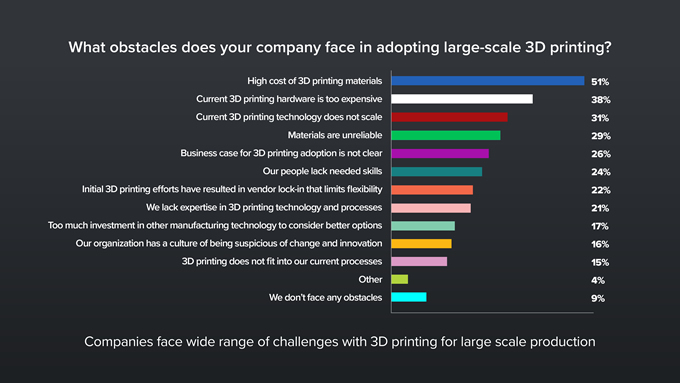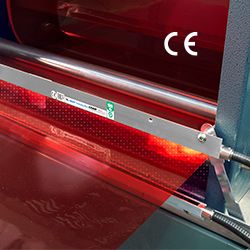Essentium Research Shows Manufacturers Demanding Open Additive Ecosystems

AUSTIN, Texas, January 15, 2019 - Essentium, Inc., a leading innovator in industrial Additive Manufacturing (AM), today announced the second in a series of findings from independent global research on the current and future use of industrial 3D printing. The study reveals that virtually all (99%) manufacturing executives surveyed believe an open ecosystem is important to advance 3D printing at scale. While 85% of manufacturers reported that industrial-scale AM has the potential to increase revenue for their business; 22% said their 3D printing efforts have resulted in vendor lock-in that limits flexibility.
Until now, the industrial AM market has been dominated by closed systems where customers are locked into vendors’ hardware, processes and materials. As the technology obstacles around economics, scale, strength and speed of production fall away, the number of manufacturers using 3D printing for full-scale production has doubled compared to last year (40% in 2019; 21% in 2018). Manufacturers are now demanding open ecosystems to overcome system inflexibility and use the materials of their choice – 50% of companies said they need high quality and affordable materials to meet the growing demand for industrial 3D printed parts.
An open additive ecosystem will see more partnerships focused on giving customers greater control of their innovation, more choice in materials, and industrial-scale production at ground-breaking economics. Market demand for Essentium’s open 3D printing ecosystem, developed in collaboration with multinational chemical company BASF and 3D software developer Materialise NV, is a clear indication that an open ecosystem approach is addressing unmet needs in the industrial additive market.
Blake Teipel, CEO and Co-founder, Essentium, said: “At Essentium, we strongly believe that an open ecosystem will be key to the evolution of Additive Manufacturing. Being locked into proprietary solutions that limit flexibility and choice is no longer an option if 3D printing is to become a serious contender as an industrial process for end-use products. An open market focused on developing new materials and better and faster machines is the only way for manufacturers to unlock new applications and new business opportunities. With this approach, the future belongs to the customer, not to the OEM.”
Survey Methodology:
162 managers and executives from large manufacturing companies across the world completed the survey on their current experiences, challenges and trends with 3D printing for production manufacturing. Participants included a mix of roles and were from companies across industries including aerospace, automotive, consumer goods and contract manufacturing.
About Essentium
Essentium, Inc. provides industrial 3D printing solutions that are disrupting traditional manufacturing processes by bringing product strength and production speed together, at scale, with a no-compromise engineering material set. Essentium manufactures and delivers innovative industrial 3D printers and materials enabling the world’s top manufacturers to bridge the gap between 3D printing and machining and embrace the future of additive manufacturing.
Comments (0)
This post does not have any comments. Be the first to leave a comment below.
Featured Product

